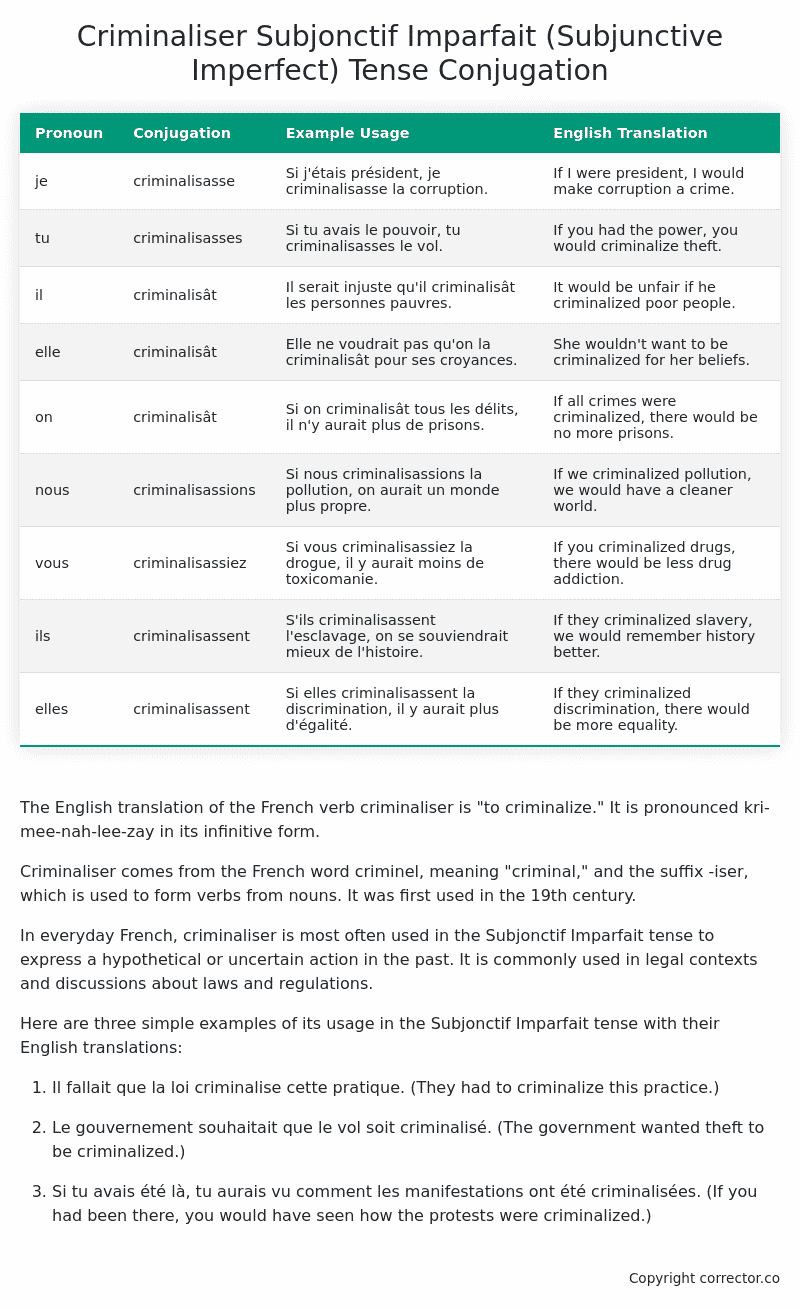Subjonctif Imparfait (Subjunctive Imperfect) Tense Conjugation of the French Verb criminaliser
Introduction to the verb criminaliser
The English translation of the French verb criminaliser is “to criminalize.” It is pronounced kri-mee-nah-lee-zay in its infinitive form.
Criminaliser comes from the French word criminel, meaning “criminal,” and the suffix -iser, which is used to form verbs from nouns. It was first used in the 19th century.
In everyday French, criminaliser is most often used in the Subjonctif Imparfait tense to express a hypothetical or uncertain action in the past. It is commonly used in legal contexts and discussions about laws and regulations.
Here are three simple examples of its usage in the Subjonctif Imparfait tense with their English translations:
-
Il fallait que la loi criminalise cette pratique.
(They had to criminalize this practice.) -
Le gouvernement souhaitait que le vol soit criminalisé.
(The government wanted theft to be criminalized.) -
Si tu avais été là, tu aurais vu comment les manifestations ont été criminalisées.
(If you had been there, you would have seen how the protests were criminalized.)
Table of the Subjonctif Imparfait (Subjunctive Imperfect) Tense Conjugation of criminaliser
| Pronoun | Conjugation | Example Usage | English Translation |
|---|---|---|---|
| je | criminalisasse | Si j’étais président, je criminalisasse la corruption. | If I were president, I would make corruption a crime. |
| tu | criminalisasses | Si tu avais le pouvoir, tu criminalisasses le vol. | If you had the power, you would criminalize theft. |
| il | criminalisât | Il serait injuste qu’il criminalisât les personnes pauvres. | It would be unfair if he criminalized poor people. |
| elle | criminalisât | Elle ne voudrait pas qu’on la criminalisât pour ses croyances. | She wouldn’t want to be criminalized for her beliefs. |
| on | criminalisât | Si on criminalisât tous les délits, il n’y aurait plus de prisons. | If all crimes were criminalized, there would be no more prisons. |
| nous | criminalisassions | Si nous criminalisassions la pollution, on aurait un monde plus propre. | If we criminalized pollution, we would have a cleaner world. |
| vous | criminalisassiez | Si vous criminalisassiez la drogue, il y aurait moins de toxicomanie. | If you criminalized drugs, there would be less drug addiction. |
| ils | criminalisassent | S’ils criminalisassent l’esclavage, on se souviendrait mieux de l’histoire. | If they criminalized slavery, we would remember history better. |
| elles | criminalisassent | Si elles criminalisassent la discrimination, il y aurait plus d’égalité. | If they criminalized discrimination, there would be more equality. |
Other Conjugations for Criminaliser.
Le Present (Present Tense) Conjugation of the French Verb criminaliser
Imparfait (Imperfect) Tense Conjugation of the French Verb criminaliser
Passé Simple (Simple Past) Tense Conjugation of the French Verb criminaliser
Passé Composé (Present Perfect) Tense Conjugation of the French Verb criminaliser
Futur Simple (Simple Future) Tense Conjugation of the French Verb criminaliser
Futur Proche (Near Future) Tense Conjugation of the French Verb criminaliser
Plus-que-parfait (Pluperfect) Tense Conjugation of the French Verb criminaliser
Passé Antérieur (Past Anterior) Tense Conjugation of the French Verb criminaliser
Futur Antérieur (Future Anterior) Tense Conjugation of the French Verb criminaliser
Subjonctif Présent (Subjunctive Present) Tense Conjugation of the French Verb criminaliser
Subjonctif Passé (Subjunctive Past) Tense Conjugation of the French Verb criminaliser
Subjonctif Imparfait (Subjunctive Imperfect) Tense Conjugation of the French Verb criminaliser (this article)
Conditionnel Présent (Conditional Present) Tense Conjugation of the French Verb criminaliser
Conditionnel Passé (Conditional Past) Tense Conjugation of the French Verb criminaliser
L’impératif Présent (Imperative Present) Tense Conjugation of the French Verb criminaliser
L’infinitif Présent (Infinitive Present) Tense Conjugation of the French Verb criminaliser
Struggling with French verbs or the language in general? Why not use our free French Grammar Checker – no registration required!
Get a FREE Download Study Sheet of this Conjugation 🔥
Simply right click the image below, click “save image” and get your free reference for the criminaliser Subjonctif Imparfait tense conjugation!

Criminaliser – About the French Subjonctif Imparfait (Subjunctive Imperfect) Tense
Formation
Common Everyday Usage Patterns
Interactions with Other Tenses
Subjonctif Présent
Indicatif Passé Composé
Conditional
Conditional Perfect
Summary
I hope you enjoyed this article on the verb criminaliser. Still in a learning mood? Check out another TOTALLY random French verb conjugation!


